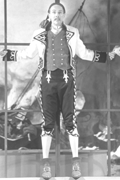Fools for Love
Paned Expression:James Winker plays a distraught Malvolio in SSC's "Twelfth Night," a comedic tale of love and self-realization.
With SSC's production of 'Twelfth Night,' both cast and audience can live happily ever after
By Sarah Phelan
Summertime, and the falling in love is easy. It's probably all the extra solar energy in the sun-ripe mosquitoes and testosterone sauce that triggers those troublesome itches and urges in the first place. Whatever the reason, once bitten, you're likely to lose your appetite, knickers and sanity, though not necessarily in that order.
Shakespeare was no stranger to these dangers, judging from the way he lays out the symptoms of lovesickness like a flush of psychological aces in Twelfth Night. The self-delusion, dizzying elation and red-faced humiliation are all here in this wickedly delicious comedy, making it the perfect choice to open Shakespeare Santa Cruz's 15th season. After all, there's nothing quite as comforting as watching other people making fools of themselves while you're munching on bread and cheese from the safety of a lawn chair outdoors in that chardonnay heaven, the Sinsheimer-Stanley Festival Glen.
Eating and drinking with unrestrained ardor probably should be mandatory during Twelfth Night anyway, since the play favors immediate oral gratification over tight-lipped abstinence. Why save your peaches and cream, when tomorrow they'll be old and wrinkled?
Sounds like a perfectly valid argument, until applied to women's supposedly fast-fading bodily delights. I guess we can't totally blame Will for this unhealthy infatuation with youthfulness, since in his day positive body image probably meant successfully avoiding decapitation. He obviously hadn't read the right manuals, or else his characters could also be crazily obsessing about advancing cellulite and sagging breasts.
What is radical about Twelfth Night is how it examines gender-specific reactions to love. Early on in the action, the shipwrecked Viola (a tomboyish Adria Woomer-Stewart) strips off her frills and corsets and assumes the identity of a man-servant named Cesario. Unlike previous bouts of SSC cross-dressing overkill, director Tim Ocel sticks to the play's original mind-boggling gender-bending to positive effect.
Ocel's choice of turn-of-the-century Scandinavia--with its incipient challenging of traditional sexual stereotypes--is conveyed by Kevin Adams' uncluttered set and B. Modern's streamlined costumes. And the wintry Nordic gloom and doom of the opening scenes, together with the high-buttoned widow's weeds worn by the grieving Olivia (Luck Harri), contrast vividly with the flowered hats and spring colors that the lovely lady dons as her sexuality suddenly thaws out under Cesario's warming influence.
Even more startling is the transition of show-stealer Malvolio (the wonderful James Winker) from sour-faced steward in impeccably tailored suits to laughingstock wearing a manic grin and yellow leggings.
Suddenly nothing is what it seems. As the whole cast is swept away on a chaotic emotional tidal wave (set against the backdrop of a storm-tossed shipwreck), it's worth remembering what your parents said about never turning your back on the ocean. Seems love can be equally life-threatening.
But don't worry: Nobody dies and almost everybody lives happily ever after.
The dynamic duo of Ken Grantham, as the drunken Sir Toby Belch, and Gregg Coffin, as the mincingly light-footed Sir Andrew Aguecheek, provide inspired slatherings of buffoonery and slapstick. Ursula Meyer makes a great flirtatious and fun-loving Maria, capably rebutting the lecherous advances of the idiotic Sir Andrew, and willingly planning a vindictive revenge on the disapproving Malvolio.
And while the latter's ensuing bear-baiting seems excessive by modern standards, it does honestly reflect the ritual abuse of hostile spirits, which was considered a form of exorcism rather than heartless practical joking in the Elizabethan era.
Feste the fool, brilliantly played by James Newcomb, is the sole voice of reason among this festival of fools. The source of much of the play's laughter, he's never its object. And in this topsy-turvy marriage of romance and satire, he mocks his social betters with his common sense, and entertains everyone with beautiful songs and piano-playing. Feste's final exit into the rain is bittersweet, and reminds us of leaving Santa Cruz's sometimes blissninny spirituality for the cynical reality of wind-torn New York.
This page was designed and created by the Boulevards team.

Shmuel Thaler
Twelfth Night continues through Sept. 1 on a rotating basis with Pericles in the outdoor Festival Glen. Call 459-2159 for ticket prices.
From the August 8-14, 1996 issue of Metro Santa Cruz
Copyright © 1996 Metro Publishing, Inc.
